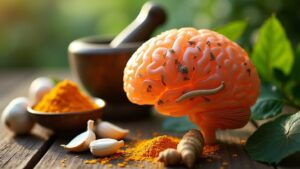Brain parasites can silently invade the nervous system, triggering headaches, seizures, or even personality changes. While medical treatment is essential, some traverse natural options like garlic or pumpkin seeds to support recovery. Avoiding contaminated water and undercooked meat lowers infection risks, but how effective are home remedies really? Comprehending the balance between science-backed solutions and alternative approaches could make all the difference for those affected. The path to clarity starts with recognizing the signs and understanding when to seek help.
Common Types of Brain Parasites and Their Symptoms
How do brain parasites invade the human body, and what signs should you watch for? Parasites like tapeworms or flukes can enter through contaminated food, water, or skin contact, leading to brain infections.
Neurocysticercosis, caused by pork tapeworm larvae, forms brain cysts and triggers seizures, headaches, or confusion. Echinococcosis creates large cysts that press on brain tissue, while Coenurosis blocks fluid flow, causing swelling. Schistosomiasis causes granulomas, mimicking stroke-like symptoms.
Common signs include nausea, vision modifications, or personality shifts. Diagnosis involves MRI scans, blood tests, or spinal fluid analysis. Treatment may include anti-parasitic drugs, surgery, or steroids to reduce swelling. Timely identification enhances outcomes, so unexplained neurological symptoms warrant medical attention. Comprehending these risks helps identify infections before they deteriorate.
Natural Remedies for Brain Parasite Management
The battle against brain parasites isn’t limited to prescription medications—nature offers potential allies in the fight. Certain herbs and oils exhibit antimicrobial and anthelmintic effects, which can help manage parasitic infections. Wormwood, black walnut, and clove are traditionally used to disrupt parasites’ life cycles. Oregano oil contains carvacrol and thymol, compounds shown to weaken parasitic activity. While these natural remedies show promise, their effectiveness varies, and professional guidance is essential. Below is a quick reference for key options:
| Remedy | Key Compound |
|---|---|
| Wormwood | Artemisinin |
| Black Walnut | Juglone |
| Oregano Oil | Carvacrol |
Always consult a healthcare provider before use, as interactions and side effects can occur.
Dietary Approaches to Support Parasite Elimination
Could dietary choices actually help the body fight off brain parasites? A balanced diet rich in specific nutrients could support the body’s ability to combat parasitic infections.
Increasing dietary fiber assists in flushing out unwanted organisms, while garlic contains compounds that disrupt parasite metabolism. Probiotics, found in yogurt and fermented foods, promote gut health and strengthen immune defenses. Foods high in vitamin A, like sweet potatoes and carrots, enhance the body’s natural resistance. Minerals such as zinc and selenium, present in nuts and seeds, further boost immune function.
These natural remedies, when combined, create an environment less hospitable to parasites. While diet alone may not eliminate infections, it plays a key role in supporting overall health during treatment. Small, consistent changes can make a significant difference.
Safety Considerations and Potential Side Effects
As natural medicine for parasite infection is considered, what routinely evades notice are the safety hazards involved? While herbs and supplements like berberine or thyme demonstrate potential against parasites, they lack robust human studies. Their use without consulting a healthcare provider risks complications, especially for vulnerable groups or those on certain medications.
Digestive distress: Common possible side effects include nausea, diarrhea, or dehydration, disrupting nutrient absorption.
Drug interactions: Certain medications, like blood thinners, could clash with antiparasitic herbs, increasing health risks.
Misdiagnosis danger: Self-treating could delay proper care from a healthcare professional, worsening the infection.
The Center for Complementary and Integrative Health advises discussing remedies with a doctor, particularly after contact with infected animals. Unverified cleanses might harm more than help.
Preventive Measures Against Brain Parasitic Infections
How can someone lower their risk of brain parasitic infections as prevention often feels overwhelming? Simple steps reduce exposure to parasites that cause brain infections. Washing hands frequently stops germs from entering the body. Drinking filtered water and consuming well-prepared food prevents ingesting harmful parasites.
Avoiding high-risk areas, especially when traveling, limits contact with infection sources. Using bug spray and bed nets blocks mosquitoes carrying parasites like malaria. Eating vitamin-packed foods—such as fruits and veggies—strengthens immunity, helping fight infections naturally. If symptoms like headaches or confusion appear, seeking professional help promptly improves outcomes.
Common parasites enter through contaminated food, water, or bug bites, so small actions make a big difference in health. Staying informed and cautious cuts risks considerably.
Conclusion
The battle against brain parasites is like traversing a dense forest—armed with knowledge, caution, and the right tools, the path becomes clearer. While nature offers remedies, they’re no substitute for a guide. Prevention, like a sturdy shield, guards the body’s gates. Yet, as shadows of infection loom, professional light is the safest beacon. Stay vigilant, but never walk alone.





